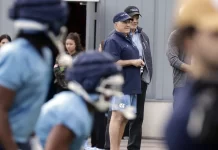By Jim Williams, Senior Columnist – Capital Sports Network
As Congress reexamines the 1961 Sports Broadcasting Act and a new wave of lobbying seeks antitrust protections for college football, SEC Commissioner Greg Sankey is making it clear: change won’t come easily.
“There’s a lot more to that than just some magic button,” Sankey said, referencing the long-term media contracts that bind major conferences and the College Football Playoff through the 2030s.
MUST READS
Background: The Antitrust Campaign
Texas Tech booster Cody Campbell has spearheaded a national ad campaign urging Congress to modernize the Sports Broadcasting Act. The goal? Allow college football programs to pool media rights—similar to how the NFL and other pro leagues operate.
Currently, individual schools delegate media rights to their conferences, resulting in fragmented deals. ESPN holds exclusive rights to the SEC, while Fox, CBS, and NBC split the Big Ten. Advocates argue that bundling rights could unlock greater revenue and scheduling flexibility across all programs.
Sankey’s Response: Existing Deals and Complex Realities
Sankey, widely regarded as the most influential figure in college football, pushed back on the notion that legislative change could override existing agreements.
“The decision we’ve made, I think should be honored,” he said. “It doesn’t seem that the suggestion that you can just make this happen honors existing agreements”.
The SEC’s deal with ESPN runs through 2034. The Big Ten is locked in until 2030, and the ACC and Big 12 are signed through 2036 and 2031 respectively. These long-term contracts make any sweeping reform legally and financially complex.
Congressional Momentum and NCAA Pressure
Meanwhile, NCAA President Charlie Baker has lobbied Congress for limited antitrust protections following a $2.8 billion settlement that allows schools to directly pay athletes. The settlement has intensified calls for federal oversight and reform across college sports.
Sankey and other commissioners have expressed support for structured regulation but remain cautious about disrupting the current broadcasting ecosystem.
As the battle over college football’s future intensifies, SEC Commissioner Greg Sankey stands as both gatekeeper and lightning rod. His resistance to sweeping antitrust reforms underscores the entrenched power of long-term media contracts and the SEC’s dominance in the sport’s financial ecosystem. But with mounting pressure from Congress, NCAA leadership, and a shifting legal landscape, Sankey’s stance may soon face its reckoning. The road ahead isn’t just about protecting existing deals—it’s about defining who controls the game in a post-settlement era. Whether Sankey bends or battles, the outcome will shape the next decade of college football.








